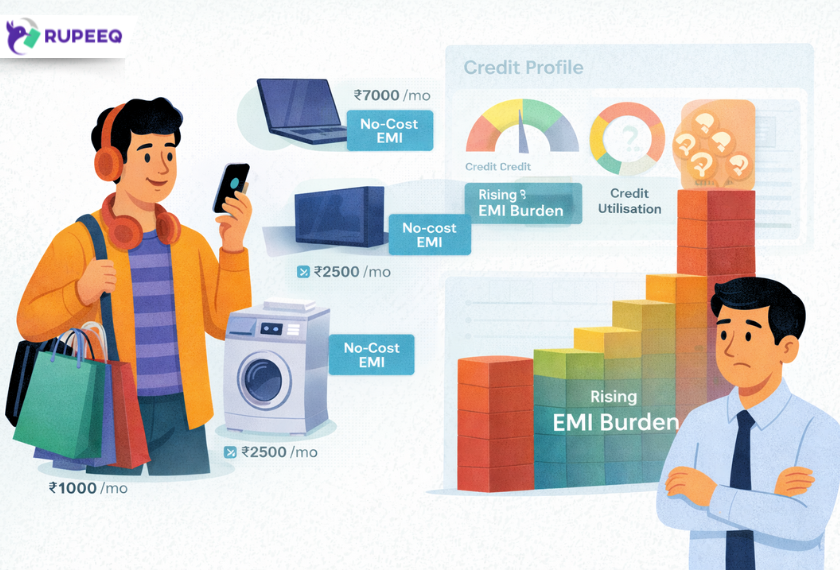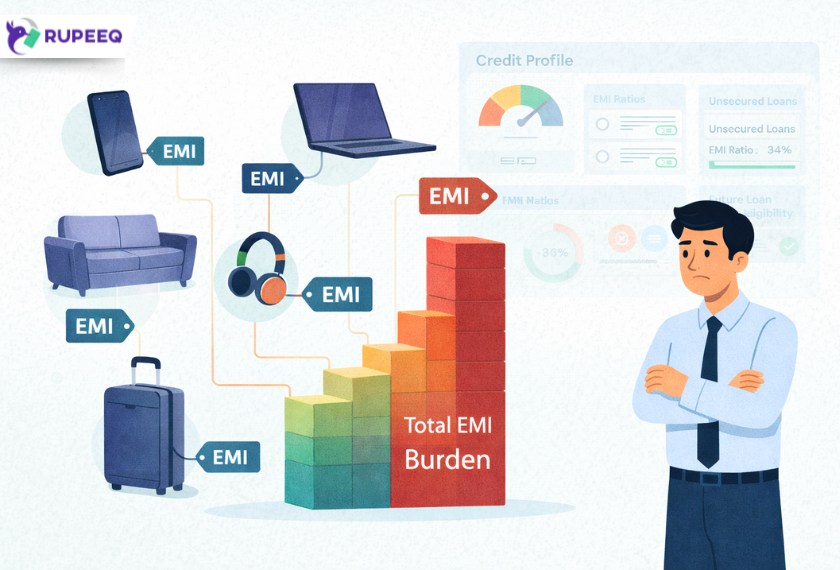Credit cards offer a convenient way to manage expenses and build a strong credit history. However, misuse or lack of awareness can lead to costly mistakes that negatively impact your credit score. Since your credit score plays a crucial role in securing loans and better interest rates, avoiding these mistakes is essential for maintaining financial health.
In this blog, we’ll explore the top 5 credit card mistakes that can harm your credit score and provide actionable tips from RupeeQ to help you stay on track.
Missing Credit Card Payments
Your payment history is the most important factor in determining your credit score, accounting for about 35% of your score calculation. Missing even a single credit card payment can lower your score significantly and result in penalties, late fees, and increased interest rates.
How it affects your credit score:
- Late payments remain on your credit report for up to seven years.
- Frequent missed payments suggest financial irresponsibility to lenders.
- Increased debt due to penalties makes it harder to repay.
How to avoid this mistake:
- Set up automatic payments or reminders for due dates.
- Opt for the minimum payment option if facing financial constraints, but aim to clear the full balance to avoid interest accumulation.
- Always keep a buffer in your bank account to avoid payment failures.
Maxing Out Your Credit Limit
Many people make the mistake of using their credit cards to their full limit without realizing its negative impact on their credit score. Credit utilization ratio—the percentage of your available credit that you’re using—contributes about 30% to your credit score.
Why maxing out hurts your credit score:
- It signals financial over-reliance on credit tools and lenders.
- High utilization rates can lower your credit score even if you pay bills on time.
- Interest accrual increases, leading to a debt cycle and you might find yourself into debt trap.
How to avoid this mistake:
- Keep your credit utilization below 30% of your total credit limit.
- Consider requesting a credit limit increase to improve your utilization ratio.
- Pay off balances in multiple installments within the billing cycle.
Applying for Too Many Credit Cards at Once
While having multiple credit cards can offer benefits such as rewards and cashback, applying for too many credit cards within a short span can hurt your credit score. Every new application results in a hard inquiry, which lenders view as a sign of credit dependency.
Consequences of multiple applications:
- Hard inquiries can lower your credit score temporarily.
- Too many new accounts shorten your average credit age, impacting your credit history.
- Lenders may perceive you as a high-risk borrower.
How to avoid this mistake:
- Space out your credit card applications by at least six months.
- Check your eligibility before applying to avoid unnecessary rejections.
- Stick to 1-2 credit cards that align with your spending habits.
RupeeQ Tip: Use RupeeQ free Credit score check to first see your creditworthiness and then only apply for any type of credit facility like cards or loans.
Closing Old Credit Card Accounts
Many individuals believe that closing old or unused credit card accounts will improve their credit score. However, closing accounts can reduce your overall credit history length and impact your credit utilization ratio.
Why closing accounts is a mistake:
- Shortens your credit history, which accounts for 15% of your score.
- Reduces your available credit, increasing your utilization ratio.
- May impact your credit mix and limit your borrowing options in the future.
How to avoid this mistake:
- Keep your old credit card accounts open, even if you use them occasionally.
- If you must close an account, choose the newest one with the smallest credit limit.
- Use old credit cards for small recurring expenses to keep them active.
RupeeQ Tip: Keep your oldest credit card active and use it for occasional small purchases to maintain a strong credit history.
Ignoring Your Credit Card Statements
Many people overlook reviewing their credit card statements regularly, which can lead to unnoticed fraudulent transactions, hidden charges, or billing errors. Ignoring statements can result in accumulating unpaid dues and negatively impact your credit score over time.
Why reviewing statements is important:
- Identifies fraudulent or incorrect charges early.
- Helps track spending habits and manage expenses better.
- Ensures you’re aware of upcoming payments and avoid defaults.
How to avoid this mistake:
- Make it a habit to review your statement every month.
- Report any discrepancies to your credit card provider immediately.
- Understand the fine print of your charges, including hidden fees or annual charges.
Conclusion about Top 5 Credit Card Mistakes Hurting Credit Score
Avoiding these common credit card mistakes can help you maintain a healthy credit score and financial stability. Timely payments, mindful spending, and a thorough understanding of your credit card usage can save you from financial trouble in the long run.
RupeeQ offers valuable tools such as free credit score checks and expert advice to help you stay informed and improve your creditworthiness. Take charge of your financial health today with RupeeQ!







